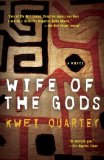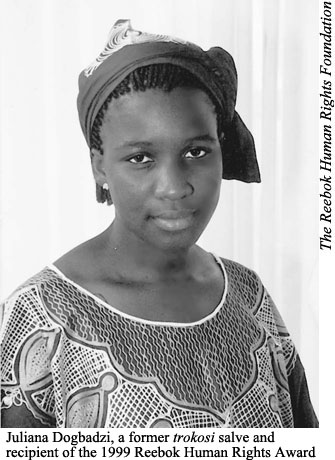Summary | Excerpt | Reviews | Beyond the Book | Read-Alikes | Genres & Themes | Author Bio

Critics' Opinion:
Readers' Opinion:
First Published:
Jul 2009, 336 pages
Paperback:
Aug 2010, 336 pages
 Book Reviewed by:
Book Reviewed by:
Kim Kovacs
Buy This Book
This article relates to Wife of the Gods
Wife of the Gods refers to a practice in Ghana known as trokosi. A trokosi is a young girl who is given to the village priest, also known as a fetish priest, to atone for a perceived sin committed by a family member; the custom is basically a form of sanctioned slavery. It is practiced primarily in the Volta region of southeast Ghana by members of the Ewe tribe, but also in parts of Benin, Nigeria and Togo, where it is known as voodoosi or vudusi. It is believed the practice began in Togo and Benin as a war ritual in the 1600s. Before combat, warriors
would offer women to the war gods in exchange for victory and a safe homecoming.
The trokosi tradition is part of the traditional fetish belief system, in which gods or spirits reside in ritual objects and in the shrine priests. The priests are considered very powerful, able to communicate directly with the gods and spirits, and even capable of determining life and death. Followers believe that the gods will punish sin by killing members of the offender's family. To avoid the wrath of the spirits, the fetish priest may instruct the family to provide a very young virgin girl (generally eight to fifteen years old, but sometimes younger) to the shrine as a slave to the gods. The girl, whose consent is not sought, will then serve the priest and shrine for three to five years or, if the crime is considered severe enough, for life.
Trokosis are considered brides of the shrine's god, but in practice they are concubines and domestic slaves of the priest, and have no rights. They
generally work long hours of manual labor, such as farming or weaving and
selling mats, with all proceeds going to support the priest and the shrine.
Most trokosis are systematically abused, both physically and sexually, and are generally denied education and basic health services. The families of the trokosis are required to pay for the upkeep of their enslaved children and provide maintenance for any children born to them; the children, in turn, belong to the priest as
slaves and are known as trokosiviwo. A trokosi who is caught trying to escape is forcibly returned to the shrine from which she fled. In most cases, if she successfully escapes, or dies, another female child from the same family must replace her. If the priest dies, the trokosi is passed on to his successor. Those girls who are released are shunned, as it is believed they will bring misfortune on those who harbor them.
 The practice was outlawed in Ghana in 1998, with a minimum sentence of three years in prison, and, due to the law and the work of advocates such as Juliana Dogbadzi, it is believed that the number of trokosi is declining. Still, it continues without much opposition from law enforcement, with approximately 5000 trokosi still enslaved in Ghana. Defenders of the practice see it as an effective means of
keeping people from committing crimes. The greatest resistance to its
abolishment comes from those who view the change as an attack on their religious
beliefs and traditional way of life. Aid groups such as International Needs Ghana (who freed Juliana Dogbadzi) are helping to free and rehabilitate trokosi, providing education and vocational training. ING has freed several thousand trokosi since the group was formed in 1995.
The practice was outlawed in Ghana in 1998, with a minimum sentence of three years in prison, and, due to the law and the work of advocates such as Juliana Dogbadzi, it is believed that the number of trokosi is declining. Still, it continues without much opposition from law enforcement, with approximately 5000 trokosi still enslaved in Ghana. Defenders of the practice see it as an effective means of
keeping people from committing crimes. The greatest resistance to its
abolishment comes from those who view the change as an attack on their religious
beliefs and traditional way of life. Aid groups such as International Needs Ghana (who freed Juliana Dogbadzi) are helping to free and rehabilitate trokosi, providing education and vocational training. ING has freed several thousand trokosi since the group was formed in 1995.
More information:
United Nations
World Wide Religious News
Washington College of Law
Photo detail: Juliana Dogbadzi, a former trokosi slave and recipient of the 1999 Reebok Human Rights Award.
Filed under Places, Cultures & Identities
![]() This "beyond the book article" relates to Wife of the Gods. It originally ran in August 2009 and has been updated for the
August 2010 paperback edition.
Go to magazine.
This "beyond the book article" relates to Wife of the Gods. It originally ran in August 2009 and has been updated for the
August 2010 paperback edition.
Go to magazine.





The Funeral Cryer by Wenyan Lu
Debut novelist Wenyan Lu brings us this witty yet profound story about one woman's midlife reawakening in contemporary rural China.
Your guide toexceptional books
BookBrowse seeks out and recommends the best in contemporary fiction and nonfiction—books that not only engage and entertain but also deepen our understanding of ourselves and the world around us.